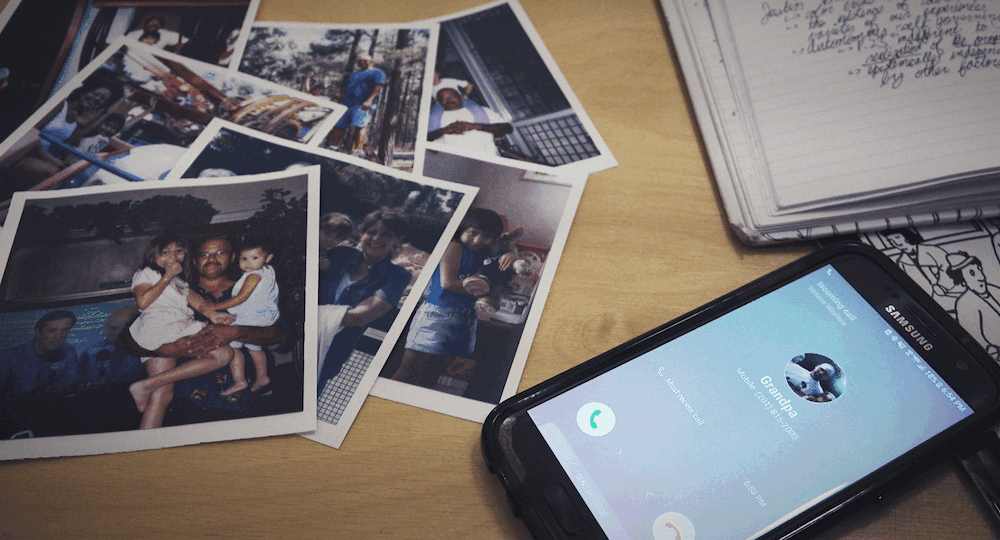![]()
Listen: Voicemails Cienna Fernandez left on her grandparents voice machine in 2003.
We have all tried to relive a moment from the past. And although time machines may not be real, the closest I’ve come to genuinely reliving a moment happened a few years ago when, my grandpa showed up at my house. He handed me a small, silver recorder that he found amongst the many other keepsakes hoarded in his garage.
The recording began with a playback of a voice automated message saying, “Thursday, 8:29 p.m,” followed by my then my five-year-old voice, “Hi nana, call me back. Ok? Love you too. Bye.”
In 2015 smart phones had taken over my life—everyone’s life, really— even my eleven-year-old sister’s. Millennials grew up in the age of the text message and so much more. We have Facetime, SnapChat, a ceaseless amount of social platforms, and anything you’re looking for—you’ve heard it before—”there’s an app for that.”
In some sense, we find ourselves using our phones for everything but making or receiving calls, like making it track our sleeping patterns or shooting out emoji filled iMessages. In the age of instant gratification the voicemail no longer seemed to suffice.
Yet even after this technological leap I felt like I was reliving my childhood sitting there listening to sixteen back-to-back voicemails I once left for my grandparents. I was reminded of the cry from my newborn baby sister and sleepovers at my kindergarten best friend’s, Lylah. I remembered the weekends my mom and I would spend with my grandparents, and the baby pink room I had at their house.
Summertime in Arizona was, swimming for hours with my grandma, binge eating Lays chips with cottage cheese. I never wanted to leave there, and these voicemails suddenly brought me back.
I laughed at myself saying, “Hi Tata, just calling to see if you’re picking me up at 12 in the morning or 12 in the afternoon.” I felt happy listening to my naive voice, and for a second I even felt that young again.
But—reality check— it’s 2017 and “No one is available to take your call, please leave a message after the tone,” and now I’m curious how many of us still do?
The History
Picture this, it’s 1970, voicemails have not yet been invented, and you’re constantly finding yourself in a never ending game of phone tag trying to get across just one simple message. Sounds pesky right?
This is the exact issue Gordon Matthews found himself in when he decided to try and solve the problem. In 1979, Matthews began collecting research through a company he created called Voice Message Express, which led him to the invention of the voicemail system by 1983.
Due to high cost, the system was only used by a few corporate companies until another company, Dialogic Communications, created PC-based voice processing equipment. This allowed accessibility to the general public, and from there voicemail technologies took off, eventually evolving into what we see and what we may or may not be using today.
However, like many other inventions, Matthews’ voicemail system depended on a few technologies and inventors that came before it. For example, the Phonautograph which is known as the first recording device that appeared in 1853, and the Electronic Secretary in 1950.
The Electronic Secretary was a system using two tapes, one to send and outgoing greeting message and another to record incoming messages. This early technology was the beginning of the modified version later used within home phone landlines in the 1980s.

Listen: Thomas Biery’s not-so-conventional answering machine message led to a pretty awkward first impression with a potential employer.
1.
Remembering the Voicemail
Thomas Biery, 21, and his family used to huddle around the home phone, recording a rendition of each his siblings and parents names.
“To me, it was one of the most exciting parts of having a phone… you get to record this little message, and no matter who calls you, they have to listen to it,” Biery said. When he was old enough for his own phone, he couldn’t wait to craft his own voice message.
Biery’s excitement for his voice message stemmed from his childhood family ritual. However, the inspiration behind the voicemail he recorded for his cellphone came from his love for the T.V. show Seinfeld.
“Believe it or not, Thomas isn’t at home. Please leave a message at the beep,” Biery sang into the recording, a catchy tune he took from the show.
However, what Biery quickly realized after getting his own phone was that no one seemed to be making calls anymore.
Years went by and Biery forgot about his harmoniously-crafted answering machine. This is, until he was off to college and decided to start applying to jobs.
Biery awoke from a nap one day, weeks after dropping off several resumes, to find a voicemail from a potential employer saying, “Thomas, you remind me of the worst part of looking through resumes… going through people’s voicemail messages.”
In complete embarrassment Biery was reminded of his old voicemail jingle and quickly changed it to something much more generic.
Despite the mishap, Biery still sees the voicemail as some form of art, an unconsciously crafted historical artifact. ”As long as you don’t delete it, it’ll always be there,” he said. “It’s a similar sort of feeling to listening to a voice on a vinyl; There’s just this extra sort of layer to it that’s a little crackly, that just makes it seem like it’s from the past. Almost like looking at a black and white photograph”
“It’s [the voicemail] just one of those things where you think it’s going to be around forever and then it’s not and things are different.” Biery said.

Listen: Voicemails left from Maya Hutchinson’s mother that bring her comfort while she’s away at school.
2.
Not Just a Generational Thing
22-year-old Maya Hutchinson finds comfort and humor in her mother’s voice through a collection of voicemails that she keeps.
Over time she began to notice her mom—who lives in California while she’s in Seattle—always leaves a voicemail when she calls.
With clashing schedules and time differences the two tend to miss each other often. Almost by default, the voicemail messages quickly became a way the two let one another know things like what they just had for lunch and what they might be doing next.
“It just sounds like we’re having a conversation and she’s telling me about her day,” Hutchinson commented after giving a listen to one of her mother’s archived voicemails in her phone.
Before college, Hutchinson said she would’ve never left voicemails for her mother like she does now. However, with miles of distance separating her from her family she found comfort in the voices of her loved ones.
“If I ever get homesick and miss my mom I listen to them. I did that when I studied abroad too. They always make me feel a little closer to home and make me smile,” Hutchinson said.
It’s Your Mother Calling: Moms love voicemails. Check out some more perspectives of motherly messages.

Listen: Returning to words of comfort: During hard times one woman turned to a longheld voicemail from her pastor for encouragement.
3.
Treasured Voices
While the voicemail has the ability to bring us back to a positive past, it also has the power to highlight a sentimental one.
One woman, who declined to be named, has kept a voicemail saved from her pastor. What it reminded her of was her struggles with suicide, but also that she was strong enough to overcome them.
“Daughter, if anything were to happen to you I would feel like I failed you,” her pastor said to her. This nurturing voice saved in her phone made her feel loved and cared about.
Listening to it brought her positivity when her struggles would arise again.
In a similar regard, 20-year-old Tessa Haas remembered coming across a voicemail from her grandmother just weeks after she had passed.
Haas’ grandmother suffered from thyroid cancer from age 59 to 69, and when she was put into hospice, Haas – who was 15 at the time—was confronted with option of whether or not to go see her to say goodbye.
With a difficult decision ahead, she decided to stay home and talk to her grandmother over the phone. It wasn’t until weeks later while cleaning out voicemails that Haas discovered an old message from her grandmother.
After a few days that she spent to gain the courage to listen, Haas remembered feeling “overwhelmed and sad about it, but it sort of brought me comfort after that to hear her voice.”

Listen: The many voices in Claire Wilmink’s voicemail box, some she’s kept saved since 2012.
4.
The Voicemail Sweetheart
Taking a moment to listen to old voicemails, 20-year-old Claire Wilmink uncovered a goldmine of memories. Voice messages dating back to 2012 reminded her of having lunch with her grandma, strange men from New York City nights, and a confusing high school boy.
Like many of our strange high school flings, Wilmink’s paints the picture of a typical millennial relationship: one where the phone gets to do all the talking.
In her freshmen year of high school, she developed a flirtatious relationship with a boy at a neighboring school. However, she was quick to realize this flirty relationship didn’t exist outside of the text messages or calls from her phone screen.
When the two sporadically ran into each other at school events during freshmen year, it was as if they had never spoken in the way that they had. They settled as friends with a lingering confusion lasting until her freshman year of college.
They brought gifts to one another from summer abroad, he dropped a kitten at her door when she told him she wished she had one, and on several drunk occasions—and only drunk occasions—he had kissed her, blurring lines of what they were, what they weren’t, and what they would never be.
Listen: Voicemail from Wilmink’s confusing high school relationship.
“The only time he ever said he liked me or had feelings for me was when he was drunk, and the days after those nights nothing was said about what was going on,” Wilmink said.
Perhaps it was the naive high school phase that kept the two apart; that question still remains. However, like you might’ve heard “a drunk mind speaks a sober heart,” and Wilmink’s truth lies within the slurred voice she keeps saved in her phone.
Latest Posts
-

One Stop Student Service Center aims to help The New School’s retention rate problem
The New School’s One Stop Student Service Center will be celebrating…
By
-

‘Finding a full-time job is a full-time job’: Students seek advice for navigating a ‘rigged’ job market at a CESJ event
Graduating college often marks the celebration of a major accomplishment —…
By
-

Federal government terminated visas of four international students at The New School
The visas of four international students at The New School have…
By
-

From GQ and Vogue: Jim Moore and Ivan Shaw reflect on style, substance, and the images that shaped a generation
“You got to put your best idea out there right away,”…
By
-



